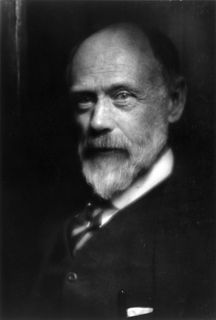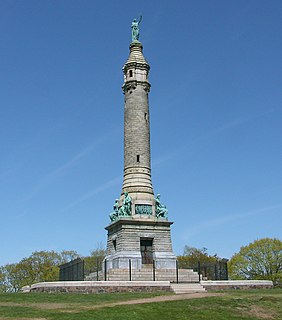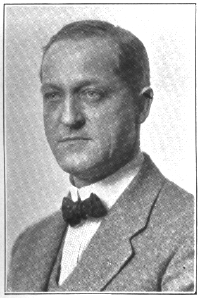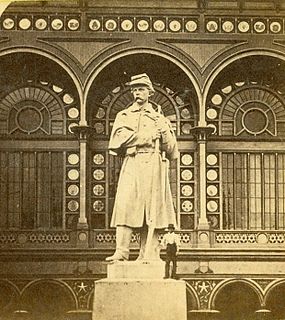
William Ordway Partridge was an American sculptor, teacher and author. Among his best-known works are the Shakespeare Monument in Chicago, the equestrian statue of General Grant in Brooklyn, the Pietà at St. Patrick's Cathedral, Manhattan, and the Pocahontas statue in Jamestown, Virginia.

Evelyn Beatrice Longman was a sculptor in the U.S. Her allegorical figure works were commissioned as monuments and memorials, adornment for public buildings, and attractions at art expositions in early 20th-century America. She was the first woman sculptor to be elected a full member of the National Academy of Design in 1919.

William Rudolf O'Donovan was an American sculptor.

Charles Henry Niehaus, was an American sculptor.

Samuel Herbert Adams was an American sculptor.

Theo Alice Ruggles Kitson, also known as Tho. A. R. Kitson and Theo Alice Ruggles, was an American sculptor.

Walker Kirtland Hancock was an American sculptor and teacher. He created notable monumental sculptures, including the Pennsylvania Railroad World War II Memorial (1950–52) at 30th Street Station in Philadelphia, Pennsylvania, and the World War I Soldiers' Memorial (1936–38) in St. Louis, Missouri. He made major additions to the National Cathedral in Washington, DC, including Christ in Majesty (1972), the bas relief over the High Altar. Works by him are at the United States Military Academy, the Library of Congress, the United States Supreme Court Building, and the United States Capitol.

The Soldiers' and Sailors' Monument is a war memorial located on the 366-foot (112 m) summit of East Rock in New Haven, Connecticut. It is visible for miles from the surrounding area and Long Island Sound. The monument was completed in 1887 and honors the residents of New Haven who gave their lives in the Revolutionary War, the War of 1812, the Mexican War, and the Civil War. It is 112 feet (34 m) high and 87 steps to the top.

John Paulding was an American sculptor best remembered for his World War I memorials. Paulding was born in Darke County, Ohio. He studied sculpture at the Art Institute of Chicago and was to remain in Chicago until his death at an early age in 1935.

Brevet Lt. General Winfield Scott is an equestrian statue in Washington, D.C., that honors career military officer Winfield Scott. The monument stands in the center of Scott Circle, a traffic circle and small park at the convergence of 16th Street, Massachusetts Avenue and Rhode Island Avenue NW. The statue was sculpted by Henry Kirke Brown, whose best-known works include statues of George Washington in New York and Nathanael Greene in Washington, D.C. It was the first of many sculptures honoring Civil War generals that were installed in Washington, D.C.'s traffic circles and squares and was the second statue in the city to honor Scott.
Bruce Wilder Saville was an American sculptor born in Quincy, Massachusetts, and known for his monuments.

George Thomas Brewster (1862–1943) was an American sculptor and architectural sculptor, known for his portraits and war memorials. Brewster also taught modeling at Cooper Union beginning 1900; Art Students League of New York beginning 1886; and Rhode Island School of Design, between 1893 and 1894.

Carl H. Conrads was an American sculptor best known for his work on Civil War monuments and his two works in the National Statuary Hall Collection at the U.S. Capitol in Washington, D.C. He was also known as Charles Conrads.

Edward Ludwig Albert Pausch was a Danish-American sculptor noted for his war memorials.
Melzar Hunt Mosman was an American sculptor who made a number of Civil War and Spanish–American War monuments in Massachusetts.

The Israel Putnam Monument is an equestrian statue located in Brooklyn, Connecticut, United States. The monument, designed by sculptor Karl Gerhardt, was dedicated in 1888 in honor of Israel Putnam, a Connecticut native who served as a general in the Continental Army during the American Revolutionary War. Upon its completion, Putnam's remains were reinterred under the monument.

General Israel Putnam is a monumental statue in Hartford, Connecticut, United States. Located in the city's Bushnell Park, the statue honors Israel Putnam, a military officer in the Continental Army during the American Revolutionary War. It was designed by sculptor John Quincy Adams Ward and dedicated in 1874.

Major General Ambrose E. Burnside, also known as the Ambrose Burnside Monument, is a monumental equestrian statue in Providence, Rhode Island, United States. The statue, located in the city's Burnside Park, was designed by sculptor Launt Thompson and depicts Ambrose Burnside, an officer in the Union Army during the American Civil War who later served as the governor of Rhode Island. The statue was dedicated on July 4, 1887 and was originally located in Exchange Place, but it was moved to its current location in the early 1900s. As part of the move, the pedestal was replaced with one designed by William R. Walker.
















